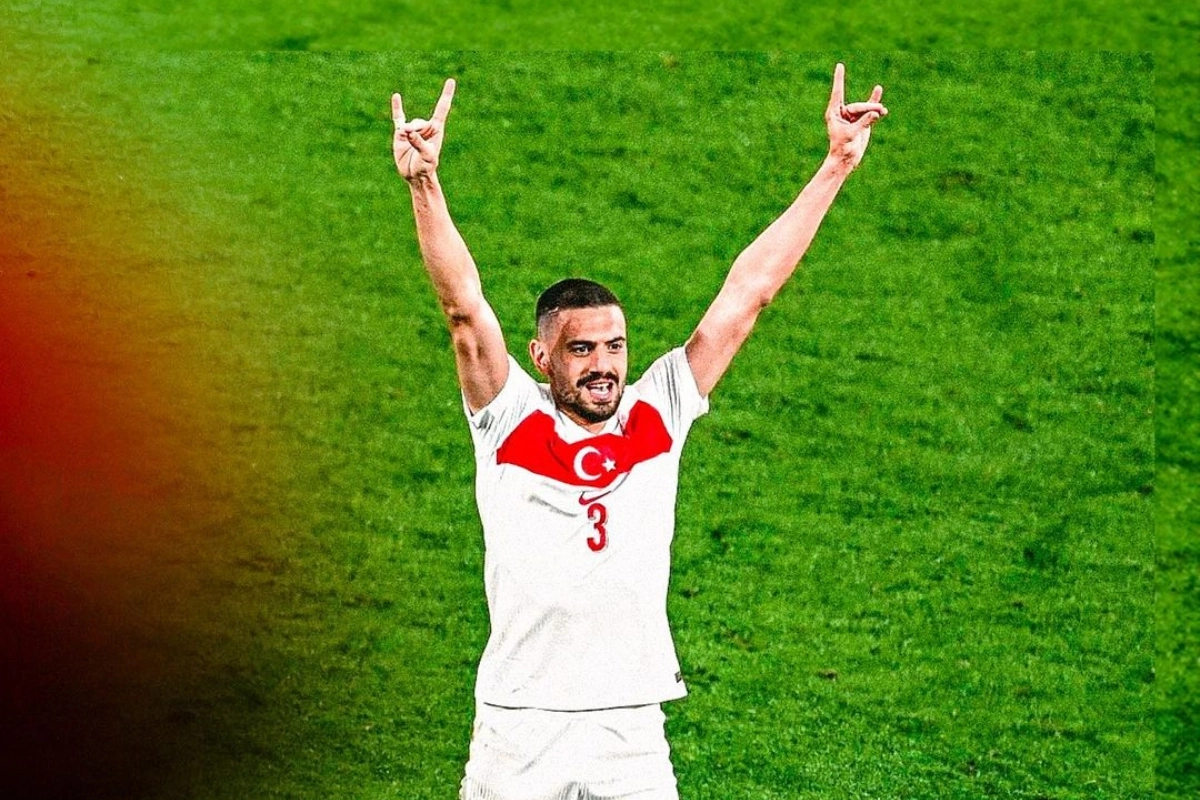
Who could think that a football match would trigger debates on the genesis and myths of the Turkic people? Merih Demiral, Team Türkiye’s midfielder has come under a spotlight after he displayed a Grey Wolf gesture to celebrate his second goal.
Image: Merih Demiral/Instagram
The Euro 2024 football championships have been a rollercoaster for fans. Start-studded teams from Belgium and England have produced lacklustre games in contrast to lively performances from plucky outsiders, including Georgia, whose highly entertaining side made the last 16 for the first time ever, albeit losing there to an on-form Spanish side.
However, it has also seen controversy over what the popular press has dubbed the ‘celebration police’, the attempts of the footballing authority, UEFA, to crack down on what they consider to be an unacceptable way for players to express their delight at scoring a goal or winning a match.
For England fans, the most galling example were threats to sanction Jude Bellingham for his apparent mime of a crotch squeeze gesture after scoring a dramatic last-minute goal with a spectacular overhead kick to save the day against Slovakia. Some headline writers exaggeratedly described this as ‘X-rated’ while bemoaning any attempt to fine or even ban the player for such an idiosyncratic way of celebrating.
However, the most striking case has been that of Merih Demiral after scoring his second goal in Turkiye’s 2-1 victory over Austria on July 2. The delight of the Turkish team in progressing to the competition’s quarter finals was tarnished by controversy over Demiral’s celebratory gesture—a so-called ‘Grey Wolf sign’ that has been criticized as inappropriate.
Known in Turkiye as the Bozkurt işareti, the so-called ‘wolf sign’ is a hand gesture in which the first and little fingers are held up as ‘ears’ while the middle and ring finger join the outstretched thumb to form a snout, the effect being very much like the form made by children to create a dog-face shadow in front of a strong light.
This apparently playful gesture is seen by many Turkic people as a symbol of pride in a common ancestry that goes beyond the current borders of today’s nation-states. It represents a mythological wolf figure, a semi-deified figure from early Turkic-Mongol pre-history, which holds a position not dissimilar to Lupa, the she-wolf who nurtures Romulus and Remus in the founding myths of Rome. In the Turkic world, various foundation stories relate how the early Turks and Mongols came close to extinction in battle and took refuge in an impenetrable valley surrounded by the harsh mountains of the Altai region (southern Siberia). Having been essentially trapped there for four centuries, they were led to more hospitable climes by a wolf called Asena. In one version of the tale, Asena nurtures a child left injured in battle, and together they produce the founding dynasty that will go on to lead the first major Turkic khaganate in the 6th century. The wolf symbol thus remains a very powerful reminder of Turkic origins, and one that was developed considerably in the 19th century as the concept of national identities blossomed. In the early 20th century, some poets and writers likened the Turkish independence leader, Mustafa Kemal Ataturk, to a wolf; this had a highly positive context in Turkish, less so by outside critics[1].
However, in the later 20th century, the Grey Wolf sign was co-opted by some right-wing political groups in Turkiye. Notably, it has long been seen as the symbol of the Grey Wolves, a staunchly pan-Turkist movement which later evolved as the MHP, a right-wing party that was banned after 1980 but reformed in 1993 and is now part of Turkiye’s ruling coalition.
The Grey Wolf sign is illegal in Austria but not in Germany, where the match was played. Nonetheless, the German Interior Minister, Nancy Faeser, stated that "the symbols of Turkish right-wing extremists have no place in our stadiums.” On X (Twitter), she went further, saying, “Using the European Football Championship as a platform for racism is completely unacceptable. We expect UEFA to investigate the case and consider sanctions.”
However, Demiral insists that the sign was merely an expression of pride at being a Turk and that this celebration of his identity had “no hidden meaning.” This is a reaction shared with many Turkic people beyond Turkiye, who insist that the symbol has transcended political meanings to become one of identity. The Turkish authorities have gone further, complaining that the investigation of the sign is, in itself, a racist action, with Ankara summoning the German ambassador and branding the issue as one of xenophobia.
Meanwhile, the importance of Damiral's performance was underlined when President Erdogan cancelled his visit to Shusha, Azerbaijan, to attend the Informal Summit of the Heads of State of the Organization of Turkic States and decided to fly to Berlin to support the Turkish national team in their 1/4 match against the Netherlands today.
Azerbaijani President Ilham Aliyev expressed support for both the Turkish team and for Demiral who has now received a two-match ban for the wolf gestures.
“I congratulate the Turkish national team, which successfully performed in the European football championship held in Germany, qualified for the 1/4 stage, and took a place among the 8 strongest European national teams. In particular, I congratulate Merih Demiral, who scored two goals in the 1/8 final stage and was elected the best player of the game. The punishment imposed on Merih is unjust, and I strongly condemn it. I wish the Turkish national team a victory in the game against the Netherlands! Long live the Turkish world!”
[1] The first major English-language biography of Ataturk was H. C. Armstrong’s 1932 ‘Grey Wolf, Mustafa Kemal’
Share on social media